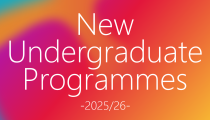Sept 2025 Entry
2 years
Normally 67 (plus 5 training credits)
The exact credits required for each AD/HD holder depend on the approved credits transferred.
The curriculum of this programme, including the credit requirements, is subject to review.
The exact study duration and number of credits to be studied will depend on the entry qualification of individual AD/HD admittees.
All information is subject to change without notice.
What's New
Programme Aims
With the rapid expansion and dissemination of information and smart communication technologies in daily life, professionals in the areas of information engineering and artificial intelligence are in great demand. This programme aims at developing graduates into artificial intelligence specialists and professionals in information engineering. The programme covers technological innovations in artificial intelligence and information engineering, focusing on machine perception and data science, as well as applications related to information engineering, such as computer vision, healthcare technology, bioinformatics, natural language processing, and automatics robotics.
Programme Characteristics
BSc (Hons) in Artificial Intelligence and Information Engineering offers an effective mix of basic theory, hands-on practice and application examples. In the latter part of Year One, students use the knowledge that they have acquired to conduct an artificial intelligence-based Integrated Project. They can focus on their selected areas by choosing relevant electives. In their Final Year, students must complete a Capstone Project.
Students can gain workplace training opportunities within and outside Hong Kong through Work-Integrated Education (WIE).
Engineering and Entrepreneurship Club (E&E Club) provides a platform to enhance students’ interests in engineering and understanding of entrepreneurship. E&E Club organises workshops to train students’ technical skills and invites experts to share about the requirements of entrepreneurship with students. It further supports students participating in both local and overseas underwater robot competitions.
Seminars, industry visits and overseas study tours are also organised to broaden students’ horizons.
Professional Recognition
Accreditation will be sought from the Hong Kong Institution of Engineers (HKIE) for the BSc (Hons) in Artificial Intelligence and Information Engineering.
Career Prospects
Information engineering encompasses vital technologies that support worldwide economic growth. With the increasing popularity of and technological advances in artificial intelligence, products and services with intelligent features are in great demand, and new models and apps are being developed every day. Upon graduation, students will possess sufficient knowledge to commence careers in the following areas:
- Smart mobile communications services -e.g., network engineer, telecommunication engineer.
-
Software I Mobile apps developments - e.g., software engineer, mobile app developer.
-
Internet-related business via the use of cloud technologies and data analytics - e.g., data scientist and engineer, intelligence system engineer.
-
Data centres - big-data developer, cloud engineer.
-
AI-related applications and development - e.g., AI specialist, machine-learning engineer.
Senior Year students will study the following subjects except those who are given credit transfer due to fulfillment of similar subjects in their prior study.
1. General University Requirement (GUR) Subjects (3 credits each, unless indicated otherwise)
a. 6 credits in Cluster-Area Requirement (CAR)
b. 3 credits in Service Learning
c. Essential Components of General Education (a non-credit bearing subject)
d. Language and Communication Requirement (LCR)
Students not meeting the equivalent standard of the Undergraduate Degree Language Communication Requirements (LCR) based on their previous academic performance in AD/HD programmes will be required to take additional credits (6 in English and 3 in Chinese) on top of the programme's normal credit requirements.
2. Discipline-Specific Requirement (DSR)
a. Compulsory Subjects (3 credits each, unless indicated otherwise)
- Big Data Analytics
- Capstone Project (6 credits)
- Computer Systems Principles
- Data and Computer Communications
- Digital Signals and Systems
- Engineering Management
- Fundamentals of Machine Intelligence
- Integrated Project
- Introduction to Internet of Things
- IP Networks
- Mobile Systems and Application Development
- Professional Communication in Chinese (2 credits)
- Professional Communication in English for Engineering Students (2 credits)
- Society and The Engineer
b. 15 credits of Elective Subjects (3 credits each, unless indicated otherwise)
- Artificial Intelligence Enabled Internet of Things
- Computer Vision and Pattern Recognition
- Deep Learning and Deep Neural Networks
- Digital Video Production and Broadcasting
- Distributed Systems and Cloud Computing
- Healthcare Technology
- Image and Audio Processing
- IoT Security
- Machine Learning in Cyber-Security
- Mobile Networking
- Multimedia Communications
- Multimodal Human Computer Interaction Technology
- Network Security
- Optical Communication Systems and Networks
c. Industrial Centre Training (5 Training Credits)
3. Work-Integrated Education
Two weeks of full-time employment for the Work-Integrated Educati on (WIE) component.
Normally 67 (plus 5 training credits)
The exact credits required for each AD/HD holder depend on the approved credits transferred.
Dr Bonnie Law
PhD, SrMIEEE
-
An Associate Degree or a Higher Diploma in Information Technology, Computer Science, Engineering, Electronic Engineering, Information Engineering, Communication Engineering, Electrical Engineering, Computer Engineering or other similar disciplines.
-
In addition to academic results, applicants’ communication skill, participation in extra-curricular activities and interview performance will also be considered.
| Tel. No. | Email Address | Website |
| 2766 6150 | eee.notice@polyu.edu.hk | www.polyu.edu.hk/eee/ |
Required
To conduct an all-round (academic and non-academic) evaluation of the interests, achievements and ability of applicants.
About 10-15 minutes
Selected applicants will be invited to interview, if necessary.






